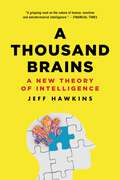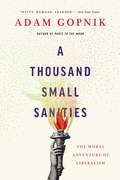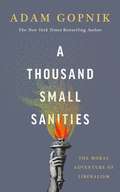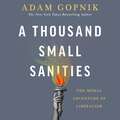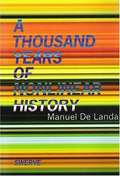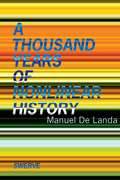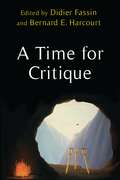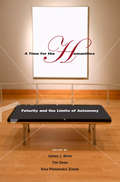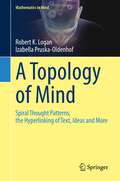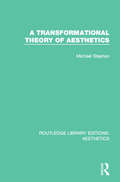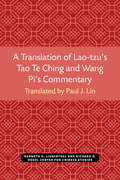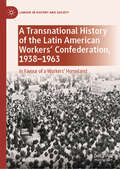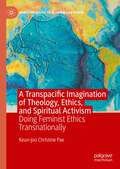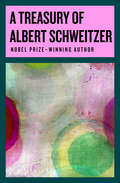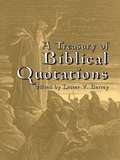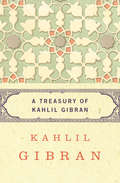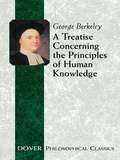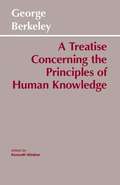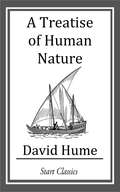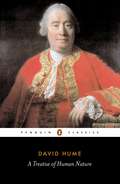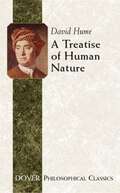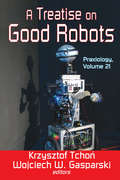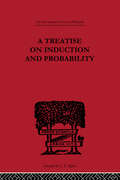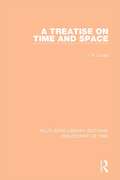- Table View
- List View
A Thousand Brains: A New Theory of Intelligence
by Jeff HawkinsA bestselling author, neuroscientist, and computer engineer unveils a theory of intelligence that will revolutionize our understanding of the brain and the future of AI. For all of neuroscience's advances, we've made little progress on its biggest question: How do simple cells in the brain create intelligence? Jeff Hawkins and his team discovered that the brain uses maplike structures to build a model of the world-not just one model, but hundreds of thousands of models of everything we know. This discovery allows Hawkins to answer important questions about how we perceive the world, why we have a sense of self, and the origin of high-level thought. A Thousand Brains heralds a revolution in the understanding of intelligence. It is a big-think book, in every sense of the word.
A Thousand Small Sanities: The Moral Adventure of Liberalism
by Adam GopnikA stirring defense of liberalism against the dogmatisms of our time from an award-winning and New York Times bestselling author.Not since the early twentieth century has liberalism, and liberals, been under such relentless attack, from both right and left. The crisis of democracy in our era has produced a crisis of faith in liberal institutions and, even worse, in liberal thought. A Thousand Small Sanities is a manifesto rooted in the lives of people who invented and extended the liberal tradition. Taking us from Montaigne to Mill, and from Middlemarch to the civil rights movement, Adam Gopnik argues that liberalism is not a form of centrism, nor simply another word for free markets, nor merely a term denoting a set of rights. It is something far more ambitious: the search for radical change by humane measures. Gopnik shows us why liberalism is one of the great moral adventures in human history -- and why, in an age of autocracy, our lives may depend on its continuation.
A Thousand Small Sanities: The Moral Adventure of Liberalism
by Adam Gopnik'WITTY, HUMANE, LEARNED' NEW YORK TIMESThe New York Times-bestselling author offers a stirring defence of liberalism against the dogmatisms of our timeNot since the early twentieth century has liberalism, and liberals, been under such relentless attack, from both right and left. The crisis of democracy in our era has produced a crisis of faith in liberal institutions and, even worse, in liberal thought.A Thousand Small Sanities is a manifesto rooted in the lives of people who invented and extended the liberal tradition. Taking us from Montaigne to Mill, and from Middlemarch to the civil rights movement, Adam Gopnik argues that liberalism is not a form of centrism, nor simply another word for free markets, nor merely a term denoting a set of rights. It is something far more ambitious: the search for radical change by humane measures. Gopnik shows us why liberalism is one of the great moral adventures in human history--and why, in an age of autocracy, our lives may depend on its continuation.
A Thousand Small Sanities: The Moral Adventure of Liberalism
by Adam Gopnik'WITTY, HUMANE, LEARNED' NEW YORK TIMESThe New York Times-bestselling author offers a stirring defence of liberalism against the dogmatisms of our timeNot since the early twentieth century has liberalism, and liberals, been under such relentless attack, from both right and left. The crisis of democracy in our era has produced a crisis of faith in liberal institutions and, even worse, in liberal thought.A Thousand Small Sanities is a manifesto rooted in the lives of people who invented and extended the liberal tradition. Taking us from Montaigne to Mill, and from Middlemarch to the civil rights movement, Adam Gopnik argues that liberalism is not a form of centrism, nor simply another word for free markets, nor merely a term denoting a set of rights. It is something far more ambitious: the search for radical change by humane measures. Gopnik shows us why liberalism is one of the great moral adventures in human history--and why, in an age of autocracy, our lives may depend on its continuation.(P)2019 Hachette Audio
A Thousand Years of Nonlinear History
by Manuel De LandaFollowing in the wake of his groundbreaking War in the Age of Intelligent Machines, Manuel De Landa presents a radical synthesis of historical development over the last one thousand years. More than a simple expository history, A Thousand Years of Nonlinear History sketches the outlines of a renewed materialist philosophy of history in the tradition of Fernand Braudel, Gilles Deleuze, and Félix Guattari, while also engaging the critical new understanding of material processes derived from the sciences of dynamics. Working against prevailing attitudes that see history as an arena of texts, discourses, ideologies, and metaphors, De Landa traces the concrete movements and interplays of matter and energy through human populations in the last millennium. De Landa attacks three domains that have given shape to human societies: economics, biology, and linguistics. In every case, what one sees is the self-directed processes of matter and energy interacting with the whim and will of human history itself to form a panoramic vision of the West free of rigid teleology and naive notions of progress, and even more important, free of any deterministic source of its urban, institutional, and technological forms. Rather, the source of all concrete forms in the West's history are shown to derive from internal morphogenetic capabilities that lie within the flow of matter-energy itself.
A Thousand Years of Nonlinear History
by Manuel De LandaFollowing in the wake of his groundbreaking work War in the Age of Intelligent Machines, Manuel De Landa presents a brilliant, radical synthesis of historical development of the last thousand years. A Thousand Years of Nonlinear History sketches the outlines of a renewed materialist philosophy of history in the tradition of Fernand Braudel, Gilles Deleuze, and Félix Guattari, while engaging — in an entirely unprecedented manner — the critical new understanding of material processes derived from the sciences of dynamics. Working against prevailing attitudes that see history merely as the arena of texts, discourses, ideologies, and metaphors, De Landa traces the concrete movements and interplays of matter and energy through human populations in the last millennium. The result is an entirely novel approach to the study of human societies and their always mobile, semi-stable forms, cities, economies, technologies, and languages.De Landa attacks three domains that have given shape to human societies: economics, biology, and linguistics. In each case, De Landa discloses the self-directed processes of matter and energy interacting with the whim and will of human history itself to form a panoramic vision of the West free of rigid teleology and naive notions of progress and, even more important, free of any deterministic source for its urban, institutional, and technological forms. The source of all concrete forms in the West’s history, rather, is shown to derive from internal morphogenetic capabilities that lie within the flow of matter—energy itself.A Swerve Edition.
A Time for Critique (New Directions in Critical Theory #58)
by Didier Fassin Bernard E. HarcourtIn a world of political upheaval, rising inequality, catastrophic climate change, and widespread doubt of even the most authoritative sources of information, is there a place for critique? This book calls for a systematic reappraisal of critical thinking—its assumptions, its practices, its genealogy, its predicament—following the principle that critique can only start with self-critique.In A Time for Critique, Didier Fassin, Bernard E. Harcourt, and a group of eminent political theorists, anthropologists, sociologists, philosophers, and literary and legal scholars reflect on the multiplying contexts and forms of critical discourse and on the social actors and social movements engaged in them. How can one maintain sufficient distance from the eventful present without doing it an injustice? How can one address contemporary issues without repudiating the intellectual legacies of the past? How can one avoid the disconnection between theory and action? How can critique be both public and collective? These provocative questions are addressed by revisiting the works of Foucault and Arendt, Said and Césaire, Benjamin and Du Bois, but they are also given substance through on-the-ground case studies that treat subaltern criticism in Palestine, emancipatory mobilizations in Syria, the antitorture campaigns of Sri Lankan activists, and the abolitionism of the African American critical resistance and undercommons movements in the United States. Examining lucidly the present challenges of critique, A Time for Critique shows how its theoretical reassessment and its emerging forms can illuminate the imaginative modalities to rejuvenate critical praxis.
A Time for the Humanities: Futurity and the Limits of Autonomy
by Tim Dean Ewa Plonowska ZiarekThis book brings together an international roster of renowned scholars from disciplines including philosophy, political theory, intellectual history, and literary studies to address the conceptual foundations of the humanities and the question of their future. What notions of the future, of the human, and of finitude underlie recurring anxieties about the humanities in our current geopolitical situation? How can we think about the unpredictable and unthought dimensions of praxis implicit in the very notion of futurity?The essays here argue that the uncertainty of the future represents both an opportunity for critical engagement and a matrix for invention. Broadly conceived, the notion of invention, or cultural poiesis, questions the key assumptions and tasks of a whole range of practices in the humanities, beginning with critique, artistic practices, and intellectual inquiry, and ending with technology, emancipatory politics, and ethics. The essays discuss a wide range of key figures (e.g., Deleuze, Freud, Lacan, Foucault, Kristeva, Irigaray), problems (e.g., becoming, kinship and the foreign, "disposable populations" within a global political economy, queerness and the death drive, the parapoetic, electronic textuality, invention and accountability, political and social reform in Latin America), disciplines and methodologies (philosophy, art and art history, visuality, political theory, criticism and critique, psychoanalysis, gender analysis, architecture, literature, art). The volume should be required reading for all who feel a deep commitment to the humanities, its practices, and its future.
A Topology of Mind: Spiral Thought Patterns, the Hyperlinking of Text, Ideas and More (Mathematics in Mind)
by Robert K. Logan Izabella Pruska-OldenhofThis volume covers many diverse topics related in varying degrees to mathematics in mind including the mathematical and topological structures of thought and communication. It examines mathematics in mind from the perspective of the spiral, cyclic and hyperlinked structures of the human mind in terms of its language, its thoughts and its various modes of communication in science, philosophy, literature and the arts including a chapter devoted to the spiral structure of the thought of Marshall McLuhan. In it, the authors examine the topological structures of hypertext, hyperlinking, and hypermedia made possible by the Internet and the hyperlinked structures that existed before its emergence. It also explores the cognitive origins of mathematical thinking of the human mind and its relation to the emergence of spoken language, and studies the emergence of mathematical notation and its impact on education. Topics addressed include:• The historical context of any topic that involves how mathematical thinking emerged, focusing on archaeological and philological evidence. • Connection between math cognition and symbolism, annotation and other semiotic processes. • Interrelationships between mathematical discovery and cultural processes, including technological systems that guide the thrust of cognitive and social evolution. • Whether mathematics is an innate faculty or forged in cultural-historical context• What, if any, structures are shared between mathematics and language
A Transformation Theory of Aesthetics
by Michael StephanThis book develops a theory of picture perception and aesthetic response, arguing that images can generate in us a complex pattern of mental changes, or transformations. It is essential reading to those seriously involved in linking the arts and cognitive sciences.
A Translation of Lao-tzu’s Tao Te Ching and Wang Pi’s Commentary (Michigan Monographs In Chinese Studies #30)
by Paul J. LinDuring the Spring-Autumn period (722–420 BCE) and the time of the Warring States (480–222 CE), China was in great turmoil. Intellectuals and social reformers sifted through their wisdom and knowledge of China’s experiences up to then, attempting to find a solution to their situation. The Tao Te Ching, one of the foremost products of the era, is a metaphysical book, a source of the highest political thought. Many readers have found in it representations of the highest ideals of human endeavors. Yet given its likely oral origin and the technological limitations of its early textual transmission, the Tao Te Ching raises numerous questions related to authorship, date of origin, internal organization, textual coherence, and editorial history. Of the scores of translations of the Tao Te Ching, the great majority are based on the edition prepared by the third-century scholar Wang Pi. Wang’s profound commentary is itself a deeply influential text in the development of Taoist thought. Paul Lin presents the commentary, otherwise unavailable in English, in the form of footnotes accompanying his meticulous rendition of the Taoist classic.
A Transnational History of the Latin American Workers' Confederation, 1938–1963: In Favour of a Workers' Homeland (Labour in History and Society)
by Patricio HerreraThis book examines the efforts of the Confederation of Latin American Workers (CTAL) in generating workers&’ unity across the continent from 1938-1963. Emerging in 1938 during a period of geopolitical instability, CTAL was systemically and actively preoccupied with the problems that affected workers in Latin America, consistently carrying out concrete actions to protect working-class interests. In doing so, CTAL initiated a process that led to the strengthening of union organisations and the promotion of a common language to defend the social and labour demands of the working class across the continent. This was particularly important due to the complex economic and political repercussions of the Second World War: namely, the high cost of basic necessities, and restrictions on collective and individual liberties. By the end of 1944, CTAL had consolidated its position as a continental union, inserted itself into international debate with organisations such as the ILO, and received widespread support from other labour organisations, including those in the USA and Canada. By analysing how international politics affected workers&’ movements across various countries, this book offers a transnational, historic overview of the working class in Latin America.
A Transpacific Imagination of Theology, Ethics, and Spiritual Activism: Doing Feminist Ethics Transnationally (New Approaches to Religion and Power)
by Keun-joo Christine PaeDespite prolific feminist voices in Christian ethics, transnational perspectives are still underdeveloped. Similarly, ‘secular’ transnational feminist scholarship often overlooks religious faith, rituals, and spirituality, crucial to many women’s liberation movements across the globe. This book aims to fill these gaps in Christian and secular feminist scholarships by constructing a transnational feminist theo-ethics. Furthermore, by bringing the theological and the transnational together, the book offers an alternative tool in analyzing social identities beyond intersectionality (i.e., interstitial approach and interstitial integrity) and thus, renews feminist theological understandings, especially of time, memories, and healing beyond linear approaches. A renewed analytical tool would help the readers critically reinterrogate the global power structure buttressed by empire, militarized capitalism, and heteropatriarchal religious ideologies at the cost of raced, sexed, and classed bodies. At the same time, the book would create space where readers create and recreate theo-ethical visions for global peace and justice constructed upon transnational feminist praxis of solidarity and spiritual activism. Case studies offer concrete sites to inform readers about how to use transnational feminist theories at a micro- and macropolitical levels, and produce transnational feminist knowledge of God, spiritual activism, and solidarity. This book is written for graduate and advanced undergraduate students in religion, gender studies, and Asian/American studies to critically engage in the political, the theological, and the spiritual from transnational perspectives not as observers but as active participants in global politics.
A Treasury of Albert Schweitzer
by Albert SchweitzerCollected here in a single volume are the most important philosophical writings of Albert Schweitzer, one of the greatest thinkers and humanitarians of our time. Carefully chosen from among his many written works, the selections in this anthology illuminate and amplify Dr. Schweitzer&’s cardinal principle of belief—a reverence for life. Among the important and revealing works included are &“Pilgrimage to Humanity,&” which outlines his philosophy of culture, the early influences in his life, and his ideal of world peace; &“The Light Within Us,&” one of the twentieth century&’s most significant and beautiful statements of one man&’s faith in his fellow man; and &“Reverence for Life,&” which states, with great clarity and conviction, the essence of Schweitzer&’s wisdom. Because of his legendary fame as a medical missionary, other equally important and outstanding aspects of Schweitzer&’s life are not as well known. Readers of this book will realize that Albert Schweitzer was a truly creative thinker, whose concern with the problems of the human spirit and whose methods of expressing this concern have raised him to the stature of one of the world&’s foremost philosophers.
A Treasury of Albert Schweitzer (Biography Index Reprint Ser.)
by Albert SchweitzerCollected here in a single volume are the most important philosophical writings of Albert Schweitzer, one of the greatest thinkers and humanitarians of our time. Carefully chosen from among his many written works, the selections in this anthology illuminate and amplify Dr. Schweitzer&’s cardinal principle of belief—a reverence for life. Among the important and revealing works included are &“Pilgrimage to Humanity,&” which outlines his philosophy of culture, the early influences in his life, and his ideal of world peace; &“The Light Within Us,&” one of the twentieth century&’s most significant and beautiful statements of one man&’s faith in his fellow man; and &“Reverence for Life,&” which states, with great clarity and conviction, the essence of Schweitzer&’s wisdom. Because of his legendary fame as a medical missionary, other equally important and outstanding aspects of Schweitzer&’s life are not as well known. Readers of this book will realize that Albert Schweitzer was a truly creative thinker, whose concern with the problems of the human spirit and whose methods of expressing this concern have raised him to the stature of one of the world&’s foremost philosophers.
A Treasury of Biblical Quotations
by Lester V. BerreyDesigned as a quick and easy reference tool, this thesaurus of scripture classifies sacred texts from the King James Version of both the Old and New Testaments by topic. Arranged alphabetically by subject, the quotes appear under headings ranging from ability, courage, and fidelity to sorrow, temptation, and zeal.
A Treasury of Kahlil Gibran
by Kahlil GibranPassionate and spiritual writings uncovering the philosophical foundations of one of the twentieth century&’s greatest thinkersKahlil Gibran&’s works are known throughout the world for their lyrical grandeur, wisdom, and insights drawn from the everyday sufferings of man. This nine-book collection captures one of modern history&’s titanic literary figures at his best. Texts such as &“The Secret of the Heart,&” &“Laughter and Tears,&” and &“Song of the Flower&” reveal the vivid splendor of life through Gibran&’s gifted similes and symbolism. Passionate and unforgettable, these verses of lyric prose impart to the reader a grand symphony of sparking joys epitomizing the qualities that have made Gibran one of the world&’s most eminent philosophical virtuosos.
A Treatise Concerning the Principles of Human Knowledge (Dover Philosophical Classics)
by George BerkeleyIf a tree falls in the forest and no one is present to hear it, does it make a sound? It does not, according to George Berkeley. Originally published in 1710, this landmark of Western philosophy introduced a revolutionary concept: immaterialism, which asserts that to be is to perceive or be perceived. An Irish clergyman who spent his entire philosophical career as a churchman, Berkeley linked his investigations to his religious interests. A Treatise Concerning the Principles of Human Knowledge opens with an assault on Locke’s theory of abstract ideas and proceeds with arguments that sensible qualities exist only when perceived as ideas. Physical objects, he claims, are no more than collections of qualities, and these sensible objects, too, are merely ideas. Berkeley relates his position to the achievements of eighteenth-century science, and proclaims the compatibility of immaterialism with traditional religion.The fullest expression of Berkeley’s doctrine of immaterialism, this classic work influenced British philosophers from David Hume to Bertrand Russell and the other logical positivists. It is essential reading for all students of philosophy.
A Treatise Concerning the Principles of Human Knowledge Part 1
by George Berkeley Kenneth WinklerKenneth Winkler's esteemed edition of Berkeley's Principles is based on the second edition (London, 1734), the last one published in Berkeley's lifetime. Like other members of Hackett's philosophical classics series, it features editorial elements found to be of particular value to students and their teachers: analytical table of contents; chronology of the author's life; selected bibliography; note on the text; glossary; and index.
A Treatise of Human Nature
by David HumeDavid Hume was a Scottish philosopher, economist, and historian. He is an important figure in Western philosophy, and in the history of the Scottish Enlightenment. Hume first gained recognition and respect as a historian, but academic interest in Hume's work has in recent years centered on his philosophical writing. His "History of England" was the standard work on English history for many years, until Macaulay's "The History of England from the Accession of James the Second". Hume was the first philosopher of the modern era to produce a naturalistic philosophy. This philosophy partly consisted in rejection of the historically prevalent conception of human minds as being miniature versions of the divine mind. This doctrine was associated with a trust in the powers of human reason and insight into reality, which possessed God's certification. Hume's scepticism came in his rejection of this 'insight ideal', and the (usually rationalistic) confidence derived from it that the world is as we represent it. Instead, the best we can do is to apply the strongest explanatory and empirical principles available to the investigation of human mental phenomena, issuing in a quasi-Newtonian project, Hume's 'Science of Man'. Hume was heavily influenced by empiricists John Locke and George Berkeley, along with various French-speaking writers such as Pierre Bayle, and various figures on the English-speaking intellectual landscape such as Isaac Newton, Samuel Clarke, Francis Hutcheson, and Joseph Butler.
A Treatise of Human Nature
by David HumeOne of the most significant works of Western philosophy, Hume's Treatise was published in 1739-40, before he was thirty years old. A pinnacle of English empiricism, it is a comprehensive attempt to apply scientific methods of observation to a study of human nature, and a vigorous attack upon the principles of traditional metaphysical thought. With masterly eloquence, Hume denies the immortality of the soul and the reality of space; considers the manner in which we form concepts of identity, cause and effect; and speculates upon the nature of freedom, virtue and emotion. Opposed both to metaphysics and to rationalism, Hume's philosophy of informed scepticism sees man not as a religious creation, nor as a machine, but as a creature dominated by sentiment, passion and appetite.
A Treatise of Human Nature (Dover Philosophical Classics Ser.)
by David HumePublished in the mid-18th century and received with indifference (it "fell dead-born from the press," noted the author), David Hume's comprehensive three-volume A Treatise of Human Nature has withstood the test of time and has had enormous impact on subsequent philosophical thought. Hume — whom Kant famously credited with having "interrupted my dogmatic slumber and gave my investigations in the field of speculative philosophy a quite new direction" — intended this work as an observationally grounded study of human nature. He employed John Locke's empiric principles, constructing a theory of knowledge to serve as a foundation for the evaluation of metaphysical ideas.Reprinted here in one volume, the Treatise begins with an examination of the nature of ideas: their origins and connections, modes and substance, and abstract qualities. The work's considerations of existence, knowledge, and identity explore the ways in which people use these concepts as a basis for firm but unproven beliefs. The second part surveys the passions, from pride and humility to contempt and respect, analyzing their roles in human choices and actions. The book concludes with a meditation on morals and an in-depth explanation of the perceived distinctions between virtue and vice.One of philosophy's most important works and a key to modern studies of 18th-century Western thought, A Treatise of Human Nature is essential reading for all students of philosophy and history.
A Treatise on Good Robots
by Krzysztof TchonThis volume investigates the ways emerging technologies in the fields of robotics and bio-robotics are influencing society. It necessarily considers both philosophical and technological study of robots, including what it means for robots to exist as good and moral entities, and how they benefit humans and enhance their quality of life. Contributors address artificial intelligence and social functions as well as technical matters. Chapters are wide-ranging, and consider robots in science fiction; the need for designers to create moral robots; specific technology; and the development of biological robots. Also addressed are robotic technologies already enhancing human bodies, such as exoskeletons that allow paraplegics to walk. The contributors foresee robots becoming involved not only in mundane domestic tasks such as washing dishes, but also in providing health care to the disabled and companionship to the elderly. This volume offers exciting philosophical reflections that unveil new connections between robotics and praxiology and their practical applications.
A Treatise on Induction and Probability (International Library of Philosophy)
by Georg Henrik Von WrightFirst published in 2000. Routledge is an imprint of Taylor & Francis, an informa company.
A Treatise on Time and Space (Routledge Library Editions: Philosophy of Time #2)
by J. R. LucasOriginally published in 1976. This comprehensive study discusses in detail the philosophical, mathematical, physical, logical and theological aspects of our understanding of time and space. The text examines first the many different definitions of time that have been offered, beginning with some of the puzzles arising from our awareness of the passage of time and shows how time can be understood as the concomitant of consciousness. In considering time as the dimension of change, the author obtains a transcendental derivation of the concept of space, and shows why there has to be only one dimension of time and three of space, and why Kant was not altogether misguided in believing the space of our ordinary experience to be Euclidean.The concept of space-time is then discussed, including Lorentz transformations, and in an examination of the applications of tense logic the author discusses the traditional difficulties encountered in arguments for fatalism. In the final sections he discusses eternity and the beginning and end of the universe. The book includes sections on the continuity of space and time, on the directedness of time, on the differences between classical mechanics and the Special and General theories of relativity, on the measurement of time, on the apparent slowing down of moving clocks, and on time and probability.
